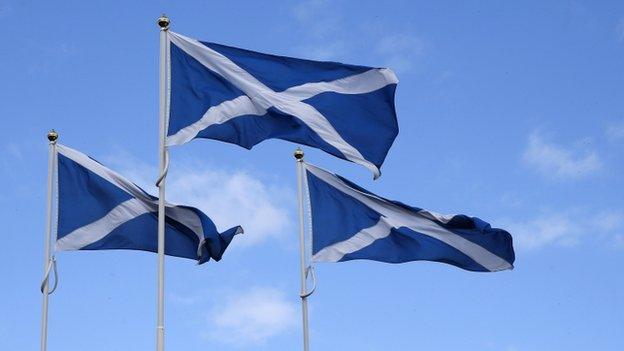Could Scotland compete on tax with Westminster?
- Published
- comments

Questions remain over Tory, Lib Dem and Labour proposals for greater Scottish control over tax
The prime minister last night hosted a party in Downing Street for more than 100 business leaders.
One of his messages was that they should be more conspicuous in selling to the Scottish people the benefits of remaining in the UK - especially the offer made to Scots yesterday by Gordon Brown, on behalf of the three main anti-independence parties, of greater budget-making and other powers for the Scottish parliament.
It tells you much of what you need to know about the fracturing of the UK - and the impairment of the idea that the prime minister represents us all, from the Highlands to Cornwall - that David Cameron has delegated the marketing of this allegedly momentous constitutional reform to his predecessor as prime minister, whose reputation is not unblemished, and to unelected folk who run big companies.
And for what it's worth, those I have been chatting with here in Edinburgh (and Dumfries, where I was yesterday) don't appear terribly interested in what the bosses think - because, as you know, for many the 2008 crash and subsequent long squeeze on living standards shattered for many the idea that the interests of top execs and the rest are closely aligned (that's the polite way of putting it).
Which some would say was implicitly recognised by Mr Cameron, when he told his guests in the evening sunshine bathing Number 10's garden that the Tories are now the only party that represents business - which, if true, probably should not be regarded as a comfortable state of affairs by companies big and small.
Scottish 'Home Rule' proposal
For now, however, the more pressing issue is whether Gordon Brown's "Home Rule" for Scotland will have a significant influence on the outcome of the referendum vote (or at least the votes of those who haven't already popped theirs in the post - and a good number yesterday told me they had already voted).
What he has proposed, and is being backed by the Tories, Lib Dems and Labour, is greater control for the Scottish parliament over income tax, benefits spending, employment policy, the railways and infrastructure spending - with decisions over pensions, some welfare, defence, foreign policy and healthcare funding (as opposed to policy) still largely the responsibility of the parliament and government in Westminster.
Now the detail of this shift of powers to Holyrood is absent. And deliberately so - because Mr Brown recognises that this transfer of authority will neither be legitimate or optimal in the absence of popular and parliamentary debate.
Which means it is unclear, for example, how far and how fast a Scottish parliament could increase or reduce the rates of income tax in relation to the rates prevailing in the the rest of the UK.
Mr Brown's paper says the Scottish parliament would have power "to raise around £2bn more in revenues beyond the recent Scotland Act, and ensure that the majority of basic rate income tax (around three quarters) and variations in top rate income taxes in Scotland will be under the control of the Scottish parliament".
As far as I can gather, the idea behind these reforms is to reassure Scots that they could be confident that they could choose to finance public services more generously than south of the border.
But there are Scots who would like to see their country competing for entrepreneurial talent more aggressively with the rest of the UK by cutting income taxes. It is not clear the extent to which Scotland could do this, under the Brown pact.
And it is slightly odd that Mr Brown's new settlement makes no reference to corporation tax at all, which appears to remain the preserve of the Treasury in London.
Perhaps more germanely, the ability of Scotland to borrow in its own right would remain heavily constrained.
Which means that the discretion of Holyrood to massively shift the balance between state and private sector - in either direction - would continue to be limited. Scotland would not find it easy to become Chile or Ireland (low tax-and-spend), on the one hand, or Cuba or Sweden on the other.
But it could not be otherwise, given that the Tories, Labour and Lib Dems have all refused to countenance a formal monetary union with an independent Scotland, because of their fears that they could not trust an independent Scotland not to live dangerously beyond its means and borrow on a scale that degraded sterling.
So there is no way that Tories, Labour and Lib Dems could allow full fiscal freedom to Scotland within the existing monetary union. because to do so would be to blow up their main argument against Alex Salmond's plans for independence.
As ever, it is the pound - and preserving its integrity - which is everywhere in the battle for Scotland's future, limiting the arms and ammunition of both sides.